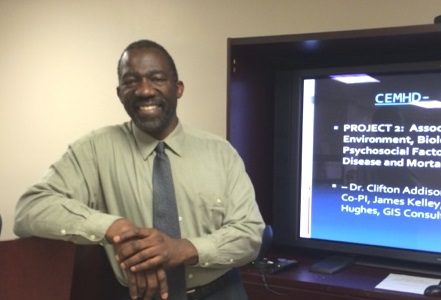 The Jackson Heart Study (JHS) Graduate Training and Education Center (GTEC) is focused on developing “the science and art of preventing disease, prolonging life, and promoting health”. This task is accomplished through the Daniel Hale Williams Scholar program which aspires to improve the science and practice of keeping the public safe and healthy by empowering graduate students to enhance their ability to improve community health. To this end, the GTEC affords scholars an opportunity to do research using the JHS data sets. The GTEC activities also enable scholars to interact with researchers and investigators who are familiar with the JHS data and JHS research. Scholars can also take advantage of opportunities to interact with renowned scientists from institutions around the country, in addition to participating in research, presentations, and publications.
The Jackson Heart Study (JHS) Graduate Training and Education Center (GTEC) is focused on developing “the science and art of preventing disease, prolonging life, and promoting health”. This task is accomplished through the Daniel Hale Williams Scholar program which aspires to improve the science and practice of keeping the public safe and healthy by empowering graduate students to enhance their ability to improve community health. To this end, the GTEC affords scholars an opportunity to do research using the JHS data sets. The GTEC activities also enable scholars to interact with researchers and investigators who are familiar with the JHS data and JHS research. Scholars can also take advantage of opportunities to interact with renowned scientists from institutions around the country, in addition to participating in research, presentations, and publications.
Reducing the gap in the number of public health professionals operating in underserved communities, improving health care delivery, and eliminating or reducing health disparities are important goals of the GTEC program that intends to facilitate the training of a public health/medical workforce of highly skilled and capable professionals. GTEC believes that this can be achieved by providing avenues for graduate students interested in public health to upgrade their capacity in epidemiology, basic public health skills, and information relevant to public health practitioners. Scholars will have opportunities to collaborate with JHS investigators to conduct data analysis and prepare manuscripts using the wealth of collected JHS data.
To develop research skills, GTEC scholars will have access to study resources and expertise as they engage with experienced researchers within and beyond the JHS in collaborative analysis of existing data to produce high-quality publications. Developing the research capability of graduate students and early-career investigators will go a long way to helping to reduce the shortage of minority biomedical researchers that currently exist in many under-served communities.

